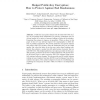1005 search results - page 61 / 201 » Practical Secure Function Evaluation |
129
click to vote
ASIACRYPT
2009
Springer
15 years 5 months ago
2009
Springer
Abstract. Public-key encryption schemes rely for their IND-CPA security on per-message fresh randomness. In practice, randomness may be of poor quality for a variety of reasons, le...
CORR
2006
Springer
15 years 2 months ago
2006
Springer
Although good encryption functions are probabilistic, most symbolic models do not capture this aspect explicitly. A typical solution, recently used to prove the soundness of such ...
102
click to vote
CRYPTO
1998
Springer
15 years 6 months ago
1998
Springer
Abstract. We evaluate constructions for building pseudo-random functions (PRFs) from pseudo-random permutations (PRPs). We present two constructions: a slower construction which pr...
162
click to vote
PPSN
2010
Springer
15 years 25 days ago
2010
Springer
Existing privacy-preserving evolutionary algorithms are limited to specific problems securing only cost function evaluation. This lack of functionality and security prevents thei...
108
click to vote
EUROCRYPT
1999
Springer
15 years 6 months ago
1999
Springer
Abstract. This work describes schemes for distributing between n servers the evaluation of a function f which is an approximation to a random function, such that only authorized su...


